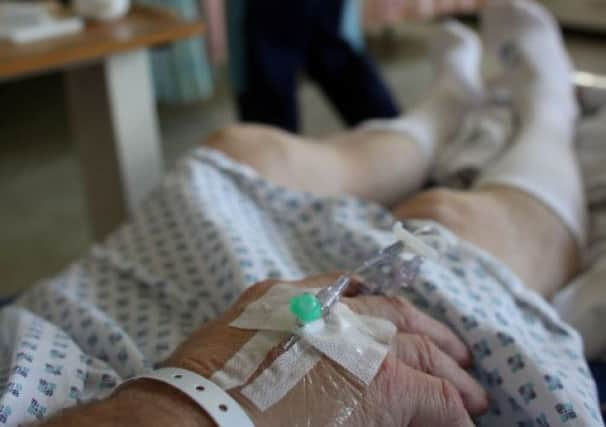28% of Scots patients ‘could die within 12 months’


The study, led by the University of Glasgow, looked at the age, health and treatment of more than 10,000 patients in 25 hospitals across Scotland identified on a single day.
The research – the first of its kind in the world – showed that 28.8 per cent of patients died within 12 months of admission to hospital.
Advertisement
Hide AdAdvertisement
Hide AdIt also found that almost one in ten patients in hospital would die during that admission.
The researchers said the findings showed that more work needed to be done to recognise when patients were nearing the end of their lives and identify their need for palliative care where appropriate.
Of the 10,743 patients the researchers studied, the majority – 64.1 per cent – were aged 65 years and over, with 54.7 per cent women and 45.3 per cent men.
Men were found to be more likely to die than women in the majority of age groups.
The mortality rate rose steeply in the older groups, with the rate three times higher at one year after admission for patients aged 85 and over, compared to those who were under 60.
Professor David Clark, head of the school of interdisciplinary studies at the University of Glasgow, said: “Until now, there has been a dearth of information on the proportion of the hospital population at any one time that is in the last year of life and therefore on how hospital policies and services can be oriented to their needs.
“We were able to link hospital records to death registrations to get an exact figure.
“One striking result was that nine per cent of patients in hospital at any one time will die on that admission.”
Advertisement
Hide AdAdvertisement
Hide AdThe research was carried out in an effort to address the growing challenge of an ageing population and the need for more palliative care services.
It is hoped that findings of the research could also help in giving advice to families as to what to do as patients near the end of their lives.
The researchers, writing in the journal Palliative Medicine, said that the role of hospitals in the delivery and planning of such care was of major significance.
Figures show that the likelihood of dying in hospital varies in different countries, but generally remains high.
One recent study ranked Scotland 12th out of 36 countries for the proportion of all deaths occurring in hospital at 59 per cent, while Japan came top at
78 per cent.
Brian Sloan, chief executive of Age Scotland, said: “These findings reinforce the need to ensure all healthcare staff are appropriately trained to both identify those who have palliative care needs, and to then have the confidence and skill to broach the subject with patients and families.
“Too many people, particularly non-cancer patients, are not being identified for palliative care early enough and they, and their loved ones, are therefore missing out on vital support, which can have a devastating impact on families.”
Mark Hazelwood, from the Scottish Partnership for Palliative Care, added: “The majority of Scots will die in hospital, so caring for people in their last year of life is a huge part of the day-to-day work of Scotland’s hospitals.
Advertisement
Hide AdAdvertisement
Hide Ad“If staff and the public are able to be open and honest about the possibility of dying, it becomes easier to plan for care that can maximise the quality of life in the important last months, days and hours of that person’s life.”